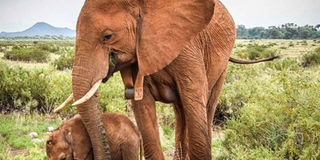Poachers expose baby elephants to harsh life

Orphans like Soutine, pictured here with her calf, have been observed socialising with different family groups in the Samburu elephant population. PHOTO | JANE WYNYARD | SAVE THE ELEPHANTS
What you need to know:
Study shows young orphan females are exposed to hostility, risk missing food
Orphans that leave their families and move into another family unit are likely to receive more aggression
- While they maintain rich and varied relationships with other elephants, they have markedly less interaction with adult females.
Young female orphan elephants have a tougher social life than non-orphans, a new study suggests, adding to a growing body of evidence of how the impacts of poaching cascade through elephant societies.
The research, part of a wider study by Save The Elephants and Colorado State University into the social impact of adult mortality on orphaned female elephants, shows orphans receive more aggression from other elephants — whether overt aggression like pushing or more subtle forms like displacements — than non-orphans.
SOCIAL INTERACTION
Orphans that leave their families and move into another family unit are likely to receive more aggression than those integrated in their natal groups.
The study, conducted over five years and led by postdoctoral researcher Shifra Goldenberg, analyses the social interaction patterns of juvenile female elephants in Northern Kenya who have lost their mothers to either poaching or natural mortality. The work shows that orphans are resilient and rebuild their social lives by strengthening relationships in response to maternal mortality.
INFORMATION
At the same time, orphans' social lives do not return to normal. While they maintain rich and varied relationships with other elephants (relatives and non-relatives), they have markedly less interaction with adult females. This reduces their access to favoured foods and resources as well as to the elders whose experience is critical to the transmission of information between generations in elephant societies. The latest findings around elephant aggression shed new light on the substantial indirect impact of poaching on orphan survivors, demonstrating that socially disadvantaged elephant orphans have a tougher life than non-orphans.
RECONSTRUCT
Between 2009 and 2013, the population of elephants in Samburu and Buffalo Springs National Reserves in Northern Kenya, where the study was conducted, was hit by increased ivory poaching and a severe drought which has left many young elephants orphaned without mothers or grandmothers.
The paper’s co-author, George Wittemyer, associate professor in the Department of Fish, Wildlife, and Conservation Biology at Colorado State University and chairman of the Scientific Board of Save The Elephants said: “The recovery of elephant populations from prolonged ivory poaching will depend largely on the ability of young females to successfully reconstruct their social lives and family groups. Deep, life long bonds are the fundamental component of elephant societies,” he said.




